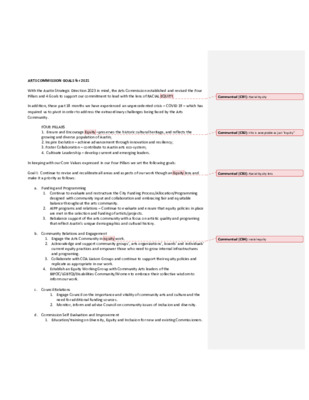2021 DRAFT ARTS COMMISSION GOALS 8-12-21 -final — original pdf
Backup

Commented [CB1]: Racial Equity Commented [CB2]: this is acceptable as just "equity" Commented [CB3]: Racial Equity lens Commented [CB4]: racial equity ARTS COMMISSION GOALS for 2021 With the Austin Strategic Direction 2023 in mind, the Arts Commission established and revised the Four Pillars and 4 Goals to support our commitment to lead with the lens of RACIAL EQUITY. In addition, these past 18 months we have experienced an unprecedented crisis – COVID 19 – which has required us to pivot in order to address the extraordinary challenges being faced by the Arts Community. FOUR PILLARS 1. Ensure and Encourage Equity –preserves the historic cultural heritage, and reflects the growing and diverse population of Austin; 2. Inspire Evolution – achieve advancement through innovation and resiliency; 3. Foster Collaboration – contribute to Austin arts eco‐system; 4. Cultivate Leadership – develop current and emerging leaders. In keeping with our Core Values expressed in our Four Pillars we set the following goals: Goal I: Continue to revise and recalibrate all areas and aspects of our work though an Equity lens and make it a priority as follows: a. Funding and Programming 1. Continue to evaluate and restructure the City Funding Process/Allocation/Programming designed with community input and collaboration and embracing fair and equitable balance throughout the arts community. 2. AIPP programs and relations – Continue to evaluate and ensure that equity policies in place are met in the selection and funding of artists/projects. 3. Rebalance support of the arts community with a focus on artistic quality and programing that reflect Austin’s unique demographics and cultural history. b. Community Relations and Engagement 1. Engage the Arts Community in equity work. 2. Acknowledge and support community groups’, arts organizations’, boards’ and individuals’ current equity practices and empower those who need to grow internal infrastructures and programing. 3. Collaborate with COA Liaison Groups and continue to support their equity policies and replicate as appropriate in our work. 4. Establish an Equity Working Group with Community Arts leaders of the BIPOC/LGBTQI/Disabilities Community/Women to embrace their collective wisdom to inform our work. c. Council Relations 1. Engage Council on the importance and vitality of community arts and culture and the need for additional funding sources. 2. Monitor, inform and advise Council on community issues of inclusion and diversity. d. Commission Self Evaluation and Improvement 1. Education/training on Diversity, Equity and Inclusion for new and existing Commissioners. 2. Conduct annual retreat for reflection and evaluation of our Equity Goals and practices. Goal II. Continue to prioritize Recovery and Resilience Assistance for the arts community 3. COVID Emergency Funding – Advocate for the swift administration and distribution of any and all available funds to address the immediate and dire needs and the survival of the arts community. 4. Investigate additional sources of funding to aid in the recovery of the arts community 5. Promote venue reuse/repurposing and outdoor programming opportunities for arts uses 6. Support existing and create new opportunities for Artists – mural programs, CCC during COVID and beyond. opportunities, etc. 7. Foster collaboration and mutual support within the arts community: resource sharing. Goal III. Build Sustainability within the Creative Community 1. Facilitate opportunities for artists and organizations to work together and come up with ideas/solutions for addressing challenges. 2. Encourage the development of mentorship programs between experienced and emerging arts organizations and artists. 3. Cultivate Leadership ‐ Have arts group self‐identify emerging leaders for further development and integrate them into existing cultural arts activities. 4. Advocate for additional funds from all sources for short and long term investment in the arts ecosystem. 5. Encourage development of cultural arts spaces in all districts. 6. Work with the AEDC to ensure the appropriate use of the Creative Space Bond funds for adding or improving city arts/music /creative facilities. Advocate for support for the arts, music and culture in all city policies. 7. 8. Advocate and encourage public/private partnerships to grow the arts ecosystem. 9. Assist in Venue reuse/repurposing and outdoor programming opportunities for arts uses. Goal IV. Increase Overall Communication and Engagement with Community, Council and Staff Increase opportunities for commission engagement with the community. 1. 2. Continue to work with COA Liaison Groups. 3. Continue to expand strategies for engagement with ALL community – making sure DIVERSE voices are included and engaged and that cultural differences are respected and embraced. Increase communication between Commissioners and Council on community issues of importance in our districts. 4. 5. Raise awareness and increase communications with constituents about issues identified and defined by the community that impact the arts or are before the commission or council. 6. Establish clear understanding of the roles and responsibilities of Commission and staff. Support staff in achieving the Cultural Arts Division’s mission and goals. Optional Background Information: As part of Austin Strategic Direction 2023, the City of Austin adopted a strong statement of commitment to achieving racial and cultural equity in the delivery of services to the public. The definition of social equity from the City of Austin Equity Office: “The City recognizes that race is the primary determinant of social equity and therefore we begin the journey toward social equity with this definition. The City of Austin recognizes historical and structural disparities and a need for alleviation of these wrongs by critically transforming its institutions and creating a culture of equity.”